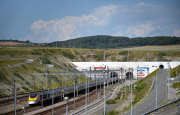
"Check against delivery"
Minister Adriaansens, dear Micky,
President and rector magnificus of the university,
Honourable Members of the European Parliament,
Representatives of the provincial and local government,
Dear Eindhoven Brainport community,
And most importantly, dear students – Europe's engineers of the future,
As an engineer myself, I am particularly pleased to be here in Eindhoven at one of Europe's premier engineering schools.
I am not surprised that you chose technological sovereignty as the main theme of today's opening of the new academic year here in Eindhoven region – a cornerstone of Europe's technological excellence, from photonics to med-tech.
I would like to take the opportunity of this opening of the academic – and political – year to reflect on the broader and fast-changing geopolitical backdrop of technological sovereignty.
Sovereignty
In 2017, French President Emmanuel Macron described sovereignty as “our ability to exist in today's world to defend our values and interests”. Last week, German Chancellor Olaf Scholz said European sovereignty “means in essence that we grow more autonomous in all fields; that we assume greater responsibility for our own security; that we stand yet more united in defence of our values and interests around the world”.
Sovereignty, as we know, is a loaded – sometimes divisive – term which lends itself to various interpretations even across our European continent. Others prefer to talk of resilience, others of (open, strategic, or plain and simple) autonomy. But rather than focus on semantics and theoretical debates, I find it helpful to seek convergence on the actual results we want for our citizens.
Today, the common aspiration to defend our European interests and values is more valid than ever. Our collective security is at stake. Energy security. Food security. Health security. Military security. Cyber security. Security of supply of the products and components we need, both in our daily lives and to remain an industrial leader, a major trading partner and a destination of foreign investment.
It is time to switch gears to keep up with the profound changes that are taking place.
World geopolitics has undergone major fragmentation over a very short period of time, with an increasing economic dominance of China, a changing transatlantic partnership, and growing pressures on democratic values around the world.
At the same time, we have stepped into an era of permacrisis: the pandemic, the ever more tangible and measurable signs of climate change, and of course Russia's war of aggression against Ukraine.
And in all of this, our dependencies are being used as a weapon against us.
But while Russia has tried to weaken the European Union, the effect has been the opposite.
In the field of energy, we are more resolute than ever to “decouple” from Russia, without self-isolating. We are diversifying our suppliers, speeding up our transition to green energy sources, and preparing a structural reform of our electricity market.
In defence, Europe is making great strides. We are finally making up for years of under-investment. Over the last twenty years, EU combined spending on defence increased only by 20%, compared to 66% in the US, nearly 300% in Russia and 600% in China! And it's not only about investing more, but also about investing better by buying together.
In technology, we have recognised that a global race is taking place and that our capacity to take our destiny into our own hands boils down essentially to the mastery of tomorrow's technologies. Breakthrough digital, dual and green technologies are becoming an essential driver of our resilience. Data, chips, quantum, hydrogen, batteries – these are key transformative technologies that we need to invest in for the real industrial revolution to happen.
I also believe that we are seeing the end of an economic era dominated by a long-standing belief in just-on-time logistics, geographical specialisation and elongated supply chains. We have ample experience now of global supply chains being disrupted by the Chinese hard lockdown policy, the war in Ukraine and our international partners' export restrictions.
Our dependencies in areas like energy and raw materials weaken us economically and politically. But we also need to rethink our supply chains from an environmental and social point of view. It is time that we confront our paradoxes, where we pursue an ambitious Green Deal yet prefer to source lithium in Chile, process it in China and then have it shipped back to Europe, rather than investing in smart mining and processing in our back yard. Or where global shipping emissions represent close to 4% of our emissions in Europe, and carbon in transit (resulting from supply chains) represents up to 10% of global emissions.
Given our commitment to fight climate change and protect our environment, it is difficult to conceive how we can maintain a model driven by greed where our citizens consume goods produced unsustainably or in countries that make us vulnerable.
We need secure and sustainable supply chains.
Self-assurance
Ladies and gentlemen,
Defending our values and interests, decoupling from Russian energy, being technological and industrial leaders: I think there is overall consensus on these aspirations. So this sovereign Europe, what does it mean in practice?
Firstly, to quote Chancellor Scholz again, “economic independence doesn't mean self-sufficiency”. I fully share this approach. Our openness is deeply entrenched in Europe's DNA, and it will remain thus. We need international trade and global value chain integration for our economy to continue thriving. As a trading nation, the Netherlands understands this better than anyone else in Europe.
What I am saying is that the European Union needs to find the means to harness globalisation differently. We need to be more assertive and less naïve in defending our economic interests and our values.
More self-assurance, to begin with, regarding our strengths and our attractiveness as the first democracy and the world's largest single market. We have incredible assets in Europe: highly qualified engineers, excellence in research, quality infrastructure, a solid manufacturing base and a strong services sector.
Some will make us believe that Europe lags behind in tech. Well, one of the companies with the highest market caps is sitting right here, and it's European [ASML].
Some will tell us that we should focus on research or produce well-established technology, and leave the commercialisation of ground-breaking advanced technology to others. Well, I say we have the vision and the means to lead on the markets of the future!
More self-assurance, secondly, regarding our ability to set our own rules of the game. I firmly believe that if we want to lead in the technological race that is taking place, we have to set our own rules and standards, and not just accept the choices of others. Let me reassure you, my approach will always be to regulate as little as possible, as much as needed. But if we remain an open continent, it needs to be on our terms, with us in the driving seat.
More self-assurance, thirdly, regarding our ability to establish a balance of powers. During the pandemic, we learnt some lessons the hard way. Remember when the Biden administration blocked vaccine supply chains because of the “America First” principle. Only when the European Union set up an export control tool were we able to negotiate from a position of strength and to unblock the supply chains, component by component, product by product.
We may not like these tools, but being able to draw on them has become a necessary evil and will make others engage with us more keenly before adopting unilateral measures. It's about building leverage and a balance of powers to never get caught off-guard.
Europe must now be ready for what I call the geopolitics of supply chains. Of course, globalisation, through trade and cooperation, is a source of knowledge, innovation and progress. But it also presents risks, which have to be anticipated and addressed when needed. That is why in preparing the Chips Act, the Single Market Emergency Instrument and the Raw Materials Act, we have looked closely at what our like-minded partners have put in place. This includes of course the US Defence Production and Inflation Reduction Acts, although we haven't emulated these word-for-word, given the EU's openness and commitment to international trade.
Since I am quoting a number of wise Europeans, allow me to refer to a recent interview you gave, dear Micky [Minister Adriaansens], in which you very rightly said: “What once was is no more. We are just being overtaken by other great powers, at some point you have to move with what is happening. That is not protectionist. I prefer to speak of healthy realism.”
This is also my vision. A more assertive Europe that looks after its own interests, that is a credible partner and builds bridges with other powers of the world as equals, with something to bring to the table.
That will be our approach with global powers like the US and China of course, as well as with regional actors such as Africa and Asia.
And this assertiveness will also remain our mantra as we redesign our relationship with other individual countries surrounding the EU that seek to retain global influence, namely the UK and Turkey.
Solidarity
Now that I have outlined the main aspects of our sovereignty, in technology and beyond, let me conclude with how to achieve this. In one word: solidarity.
The financial meltdown, refugee crisis, pandemics and lockdowns, war in Ukraine, disruptions to global supply chains, energy and commodity dependencies, and rising social anger against a backdrop of record inflation... In the face of the challenges we face, we do better when we stand together.
In the same way that no European country could have faced COVID-19 on its own, no country today has the means, on its own, to free itself from Russian energy dependence, to ensure the military investments necessary for an autonomous defence or to succeed in the green transition that our fellow citizens are calling for.
For this solidarity to work, each Member State must take its responsibilities and implement all the necessary measures to reduce Russian gas demand. I am aware this includes difficult decisions, such as the ones Belgium and Germany are taking regarding nuclear. Or that it requires good mobilisation and coordination of public and private actors when facing technical challenges, like in France around the maintenance of nuclear plants. And that sometimes it may, for a short while, take us one step back vis-à-vis our climate or environmental ambition. You experience it here, with the ramping up of coal generation or the reflections on gas exploitation. In any case, given the unprecedented “gas shock” Europe is experiencing, I think we should not refrain ourselves from exploring all options on the table.
And of course, delivering on this ambitious agenda requires massive public and private investment in technology.
So all of this comes at a cost. How will we finance these massive investments?
In the difficult discussions ahead, we must overcome clichés, ready-made ideas and easy divisions.
Budgetary virtue cannot be the Alpha and Omega of our common project. Of course, I am not suggesting that we stop moderating public spending, an imperative that I have practised in my past functions myself as Finance Minister.
But in modernising the Stability Pact we need an open debate – without taboos – on the full picture and comparative state of the debt, of our debts.
For example, it is high time that we include defence spending in this picture. Since the creation of the euro zone, European countries have accumulated a deficit of €1.3 trillion in defence spending compared to the objective of 2% of GDP. If each country had met its defence investment targets, their debt levels would have increased by at least a dozen GDP percentage points.
The same applies to what I would call “carbon debt”, the consequence of the sovereign choices made by the Member States in their energy mix between gas, coal, renewable or nuclear energy. Since 1999, Europe has emitted 90 billion tonnes of CO2, which corresponds to a carbon bill of €7,200 billion at the current price per tonne of carbon, with emissions unevenly spread across the continent. Germany alone emitted 23% of total emissions, equivalent to a debt of 49 GDP percentage points.
My point is that when we look at the real whole picture of the debt (financial, defence, carbon), the starting point for each Member State in the forthcoming budgetary discussions is quite different from what it appears.
The notion of virtue is therefore very subjective – and indeed not very representative of the efforts made by Member States if one takes a broad spectrum of policies.
I would advocate that to be able to jointly master the challenges at hand, including the common investments needed for our technological sovereignty, we adopt a new objective public finance management method, which does not point fingers and pits the good against the bad, the frugals against the profligates.
We have to admit that the reality is much more complex – and more conducive to the solidarity, self-assurance and sovereignty that Europe urgently needs to shape the course of things for the better.
I count on your engagement.
Thank you.
Photo by European Parliament from EU, Wikimedia commons.






































